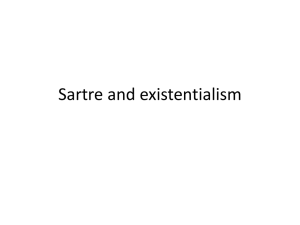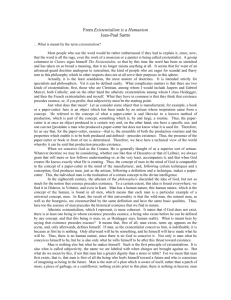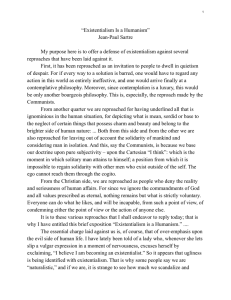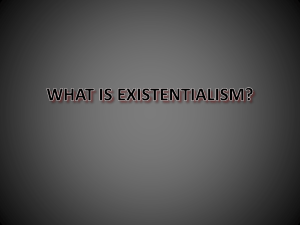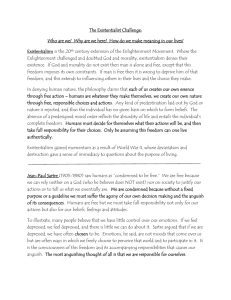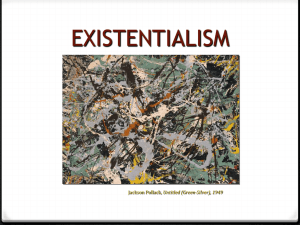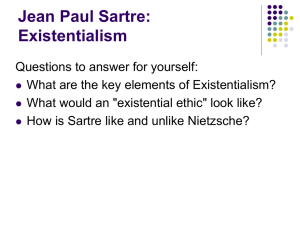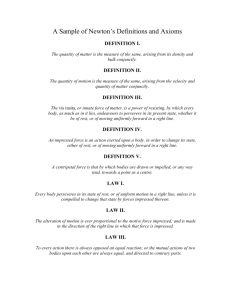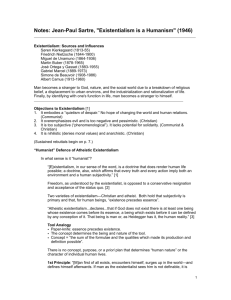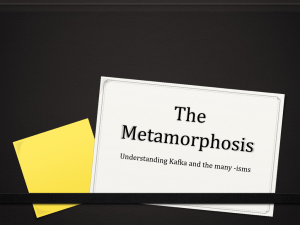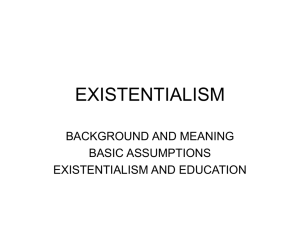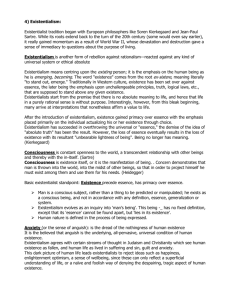Sartre on Existentialism (excerpt)
advertisement
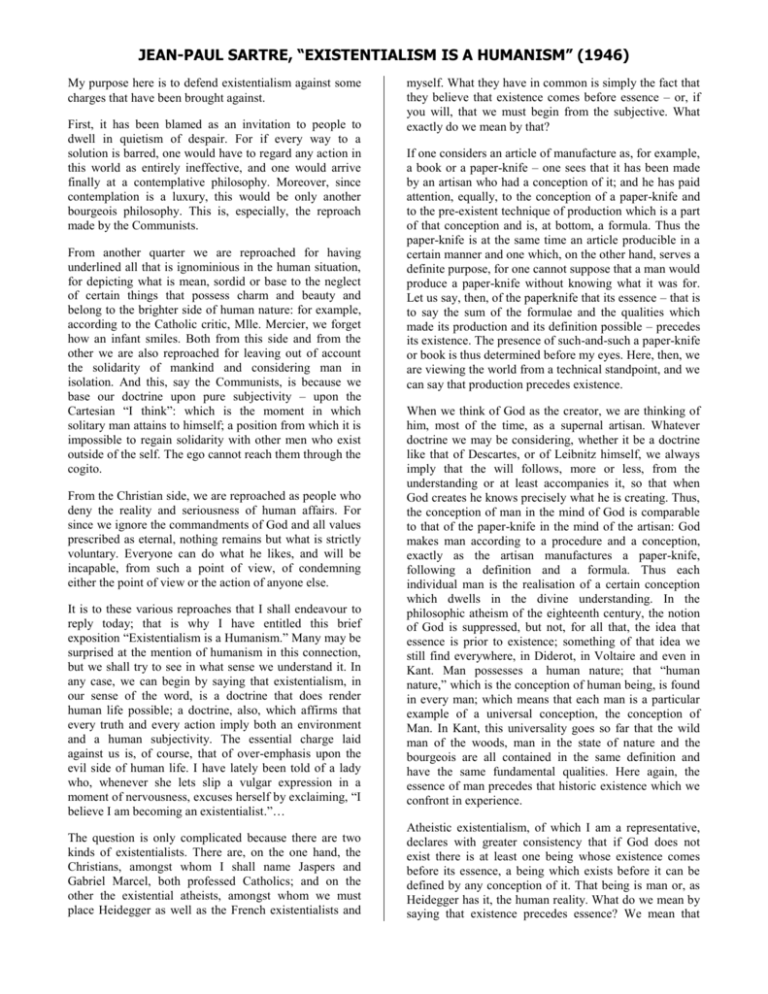
JEAN-PAUL SARTRE, “EXISTENTIALISM IS A HUMANISM” (1946) My purpose here is to defend existentialism against some charges that have been brought against. First, it has been blamed as an invitation to people to dwell in quietism of despair. For if every way to a solution is barred, one would have to regard any action in this world as entirely ineffective, and one would arrive finally at a contemplative philosophy. Moreover, since contemplation is a luxury, this would be only another bourgeois philosophy. This is, especially, the reproach made by the Communists. From another quarter we are reproached for having underlined all that is ignominious in the human situation, for depicting what is mean, sordid or base to the neglect of certain things that possess charm and beauty and belong to the brighter side of human nature: for example, according to the Catholic critic, Mlle. Mercier, we forget how an infant smiles. Both from this side and from the other we are also reproached for leaving out of account the solidarity of mankind and considering man in isolation. And this, say the Communists, is because we base our doctrine upon pure subjectivity – upon the Cartesian “I think”: which is the moment in which solitary man attains to himself; a position from which it is impossible to regain solidarity with other men who exist outside of the self. The ego cannot reach them through the cogito. From the Christian side, we are reproached as people who deny the reality and seriousness of human affairs. For since we ignore the commandments of God and all values prescribed as eternal, nothing remains but what is strictly voluntary. Everyone can do what he likes, and will be incapable, from such a point of view, of condemning either the point of view or the action of anyone else. It is to these various reproaches that I shall endeavour to reply today; that is why I have entitled this brief exposition “Existentialism is a Humanism.” Many may be surprised at the mention of humanism in this connection, but we shall try to see in what sense we understand it. In any case, we can begin by saying that existentialism, in our sense of the word, is a doctrine that does render human life possible; a doctrine, also, which affirms that every truth and every action imply both an environment and a human subjectivity. The essential charge laid against us is, of course, that of over-emphasis upon the evil side of human life. I have lately been told of a lady who, whenever she lets slip a vulgar expression in a moment of nervousness, excuses herself by exclaiming, “I believe I am becoming an existentialist.”… The question is only complicated because there are two kinds of existentialists. There are, on the one hand, the Christians, amongst whom I shall name Jaspers and Gabriel Marcel, both professed Catholics; and on the other the existential atheists, amongst whom we must place Heidegger as well as the French existentialists and myself. What they have in common is simply the fact that they believe that existence comes before essence – or, if you will, that we must begin from the subjective. What exactly do we mean by that? If one considers an article of manufacture as, for example, a book or a paper-knife – one sees that it has been made by an artisan who had a conception of it; and he has paid attention, equally, to the conception of a paper-knife and to the pre-existent technique of production which is a part of that conception and is, at bottom, a formula. Thus the paper-knife is at the same time an article producible in a certain manner and one which, on the other hand, serves a definite purpose, for one cannot suppose that a man would produce a paper-knife without knowing what it was for. Let us say, then, of the paperknife that its essence – that is to say the sum of the formulae and the qualities which made its production and its definition possible – precedes its existence. The presence of such-and-such a paper-knife or book is thus determined before my eyes. Here, then, we are viewing the world from a technical standpoint, and we can say that production precedes existence. When we think of God as the creator, we are thinking of him, most of the time, as a supernal artisan. Whatever doctrine we may be considering, whether it be a doctrine like that of Descartes, or of Leibnitz himself, we always imply that the will follows, more or less, from the understanding or at least accompanies it, so that when God creates he knows precisely what he is creating. Thus, the conception of man in the mind of God is comparable to that of the paper-knife in the mind of the artisan: God makes man according to a procedure and a conception, exactly as the artisan manufactures a paper-knife, following a definition and a formula. Thus each individual man is the realisation of a certain conception which dwells in the divine understanding. In the philosophic atheism of the eighteenth century, the notion of God is suppressed, but not, for all that, the idea that essence is prior to existence; something of that idea we still find everywhere, in Diderot, in Voltaire and even in Kant. Man possesses a human nature; that “human nature,” which is the conception of human being, is found in every man; which means that each man is a particular example of a universal conception, the conception of Man. In Kant, this universality goes so far that the wild man of the woods, man in the state of nature and the bourgeois are all contained in the same definition and have the same fundamental qualities. Here again, the essence of man precedes that historic existence which we confront in experience. Atheistic existentialism, of which I am a representative, declares with greater consistency that if God does not exist there is at least one being whose existence comes before its essence, a being which exists before it can be defined by any conception of it. That being is man or, as Heidegger has it, the human reality. What do we mean by saying that existence precedes essence? We mean that man first of all exists, encounters himself, surges up in the world – and defines himself afterwards. If man as the existentialist sees him is not definable, it is because to begin with he is nothing. He will not be anything until later, and then he will be what he makes of himself. Thus, there is no human nature, because there is no God to have a conception of it. Man simply is. Not that he is simply what he conceives himself to be, but he is what he wills, and as he conceives himself after already existing – as he wills to be after that leap towards existence. Man is nothing else but that which he makes of himself. That is the first principle of existentialism. And this is what people call its “subjectivity,” using the word as a reproach against us. But what do we mean to say by this, but that man is of a greater dignity than a stone or a table? For we mean to say that man primarily exists – that man is, before all else, something which propels itself towards a future and is aware that it is doing so. Man is, indeed, a project which possesses a subjective life, instead of being a kind of moss, or a fungus or a cauliflower. Before that projection of the self nothing exists; not even in the heaven of intelligence: man will only attain existence when he is what he purposes to be. Not, however, what he may wish to be. For what we usually understand by wishing or willing is a conscious decision taken – much more often than not – after we have made ourselves what we are. I may wish to join a party, to write a book or to marry – but in such a case what is usually called my will is probably a manifestation of a prior and more spontaneous decision. If, however, it is true that existence is prior to essence, man is responsible for what he is. Thus, the first effect of existentialism is that it puts every man in possession of himself as he is, and places the entire responsibility for his existence squarely upon his own shoulders. And, when we say that man is responsible for himself, we do not mean that he is responsible only for his own individuality, but that he is responsible for all men. The word “subjectivism” is to be understood in two senses, and our adversaries play upon only one of them. Subjectivism means, on the one hand, the freedom of the individual subject and, on the other, that man cannot pass beyond human subjectivity. It is the latter which is the deeper meaning of existentialism. When we say that man chooses himself, we do mean that every one of us must choose himself; but by that we also mean that in choosing for himself he chooses for all men. For in effect, of all the actions a man may take in order to create himself as he wills to be, there is not one which is not creative, at the same time, of an image of man such as he believes he ought to be. To choose between this or that is at the same time to affirm the value of that which is chosen; for we are unable ever to choose the worse. What we choose is always the better; and nothing can be better for us unless it is better for all. If, moreover, existence precedes essence and we will to exist at the same time as we fashion our image, that image is valid for all and for the entire epoch in which we find ourselves. Our responsibility is thus much greater than we had supposed, for it concerns mankind as a whole. If I am a worker, for instance, I may choose to join a Christian rather than a Communist trade union. And if, by that membership, I choose to signify that resignation is, after all, the attitude that best becomes a man, that man’s kingdom is not upon this earth, I do not commit myself alone to that view. Resignation is my will for everyone, and my action is, in consequence, a commitment on behalf of all mankind. Or if, to take a more personal case, I decide to marry and to have children, even though this decision proceeds simply from my situation, from my passion or my desire, I am thereby committing not only myself, but humanity as a whole, to the practice of monogamy. I am thus responsible for myself and for all men, and I am creating a certain image of man as I would have him to be. In fashioning myself I fashion man. (For Sartre’s complete lecture, see: http://www.marxists.org/reference/archive/sartre/works/e xist/sartre.htm.)
